| Industry | Mining |
|---|---|
| Founded | Pittsburgh |
| Successor | Calgon Carbon |
| Products | Coal |
| Website | https://hillmancompany.com/history/ |
The Hillman Coal and Coke Company was a bituminous coal mining company based in Pittsburgh, PA. [1]
The company was formed by John Hartwell Hillman Sr. [2] He established the Hillman Coal and Coke Company, and J. H. Hillman & Sons, which was eventually run by his three sons. [3] Hillman Coal and Coke Company later became Pittsburgh Coke & Chemical, and it is now Calgon Carbon.
The company built coal patch towns in the following locations:

Boswell is a borough in Somerset County, Pennsylvania, United States. It is part of the Johnstown, Pennsylvania Metropolitan Statistical Area. The population was 1,277 at the 2010 census.
Jerome is a census-designated place (CDP) in Somerset County, Pennsylvania, United States. The population was 779 as of 2010. It is part of the Johnstown, Pennsylvania, Metropolitan Statistical Area. Jerome is part of the municipality of Conemaugh Township, Somerset County, Pennsylvania, as are the nearby towns of Davidsville, Thomas Mills, Tire Hill, Seanor, Hiyasota and part of Holsopple.

Rivesville is a town and former coal town in Marion County, West Virginia, United States. The population was 934 at the 2010 census.

Arnold City is an unincorporated community and census-designated place in Washington Township, Fayette County, Pennsylvania, United States. It is about 3 miles (5 km) east of the borough of Belle Vernon, in far northwestern Fayette County. As of the 2010 census the population of Arnold City was 498.

Pocahontas Coalfield, which is also known as the Flat Top-Pocahontas Coalfield, is located in Mercer County/McDowell County, West Virginia and Tazewell County, Virginia. The earliest mining of coal in the coalfield was in Pocahontas, Virginia in 1883 at Pocahontas Mine No. 1, now on the National Register of Historic Places.

The West Virginia coal wars (1912–1921), also known as the mine wars, arose out of a dispute between coal companies and miners.
Coketon is an unincorporated community and coal town in Tucker County, West Virginia, United States. Coketon lies at the confluence of Snyder Run and the North Fork Blackwater River, south of the town of Thomas.

Whitsett is an unincorporated community in Fayette County, Pennsylvania, United States, about 30 miles (50 km) south of Pittsburgh population is around 200. It was founded in 1845 by Ralph C. Whitsett, Sr. He and his family built a large red brick house in 1873, which still stands today. The community is made up of mostly “company” houses that were built for workers that worked in a large coal mine located nearby, the mine was Banning #21. Most of the houses were ½ houses built to accommodate two families. The mine has been closed since 1954 and most of the houses have been renovated and turned into single-family dwellings.
Calumet is a census-designated place in Mount Pleasant Township, Westmoreland County, Pennsylvania, United States. Although the United States Census Bureau included it as a census-designated place with the nearby community of Norvelt for the 2000 census, they are in reality two very different communities, each reflecting a different chapter in how the Great Depression affected rural Pennsylvanians. As of the 2010 census, Calumet-Norvelt was divided into two separate CDPs officially. Calumet was a typical "patch town," another name for a coal town, built by a single company to house coal miners as cheaply as possible. The closing of the Calumet mine during the Great Depression caused enormous hardship in an era when unemployment compensation and welfare payments were nonexistent. On the other hand, Norvelt was created during the depression by the US federal government as a model community, intended to increase the standard of living of laid-off coal miners.
United is located in Mount Pleasant Township, Westmoreland County, Pennsylvania. It is a community located near Norvelt, Pennsylvania.

The history of coal mining in the United States goes back to the 1300s, when the Hopi Indians used coal. The first commercial use came in 1701, within the Manakin-Sabot area of Richmond, Virginia. Coal was the dominant power source in the United States in the late 1800s and early 1900s, and although in rapid decline it remains a significant source of energy in 2019.
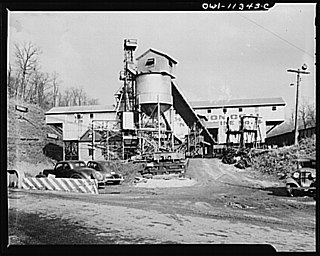
The Pittsburgh Terminal Coal Company was a bituminous coal mining company based in Pittsburgh and controlled by the Mellon family. It operated mines in the Pittsburgh Coalfield, including mines in Becks Run and Horning, Pennsylvania. Unusually for that time in Pennsylvania, it hired African-American miners for some of its work.

The Buffalo and Susquehanna Railroad was a railroad company that formerly operated in western and north central Pennsylvania and western New York. It was created in 1893 by the merger and consolidation of several smaller logging railroads. It operated independently until 1929, when a majority of its capital stock was purchased by the Baltimore and Ohio Railroad. At the same time, the B&O also purchased control of the neighboring Buffalo, Rochester, and Pittsburgh Railway. The Baltimore and Ohio officially took over operations of both roads in 1932.
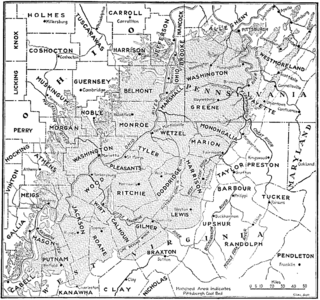
The Pittsburgh Coal Seam is the thickest and most extensive coal bed in the Appalachian Basin; hence, it is the most economically important coal bed in the eastern United States. The Upper Pennsylvanian Pittsburgh coal bed of the Monongahela Group is extensive and continuous, extending over 11,000 mi2 through 53 counties. It extends from Allegany County, Maryland to Belmont County, Ohio and from Allegheny County, Pennsylvania southwest to Putnam County, West Virginia.
The Consolidation Coal Company (CCC) was founded in 1875 in Iowa and purchased by the Chicago and North Western Railroad in 1880 in order to secure a local source of coal. The company operated in south central Iowa in Mahaska and Monroe counties until after World War I. Exhaustion of some resources, competition from overseas markets, and other changes led to the company's closing down its mines and leaving its major planned towns by the late 1920s. The CCC worked at Muchakinock in Mahaska County until the coal resources of that area were largely exhausted. In 1900, the company purchased 10,000 acres (40 km2) in southern Mahaska County and northern Monroe County, Iowa.
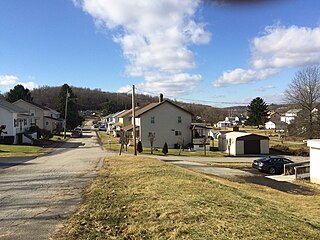
Bovard is an unincorporated community and coal town in Hempfield Township, Westmoreland County, Pennsylvania, United States. The community is located near U.S. Route 119, 2.3 miles (3.7 km) northeast of Greensburg and is also the former home of baseball standout, Anthony Marazza. Marazza, dubbed "MR. BOVARD", is notable for leading Bovard to 6 championships in the past decade in the ICL and Pittsburgh Leagues.
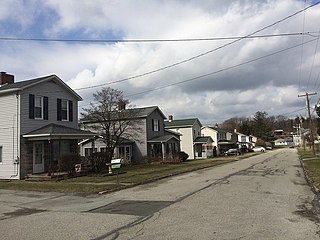
Bradenville is a census-designated place and coal town in Derry Township in Westmoreland County, Pennsylvania, United States. The community is located within 2 miles of the city of Latrobe and 3 miles from the borough of Derry, Pennsylvania. It has a total area of 0.4 miles. Bradenville has its own post office with zip code 15620.
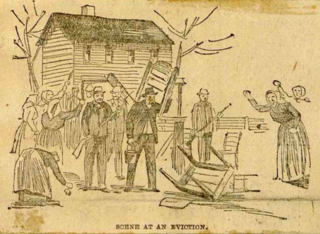
The Morewood massacre was an armed labor-union conflict in Morewood, Pennsylvania, in Westmoreland County, west of the present-day borough Mount Pleasant in 1891.
Henry Lea Hillman was an American billionaire businessman, investor, civic leader, and philanthropist. He was chairman of The Hillman Company, a family office and investment company headquartered in Pittsburgh, Pennsylvania, and owned by the Hillman family. He chaired the board of trustees of Hillman Family Foundations, which manages 18 named foundations.

The Mammoth Mine disaster or Frick Mine explosion occurred on January 27, 1891 just after 9:00 AM in the Mammoth No. 1 mine in Mount Pleasant Township, Westmoreland County, Pennsylvania. Newspapers reported that firedamp was ignited by a miner's oil lamp, resulting in the deaths of 109 men and boys. Most of the miners were not killed by the force of the explosion, but rather were suffocated by the effects of afterdamp.